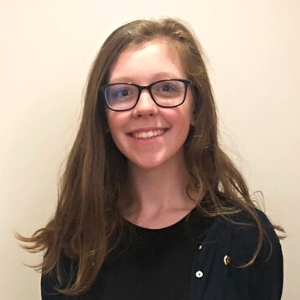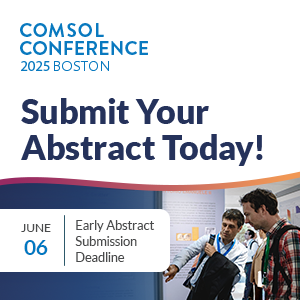
Engineers and researchers from industry and academia gathered at the COMSOL Conference 2024 Florence to meet in person, exchange ideas, and gain inspiration from each other. Through keynote talks from industry leaders, presentations by invited speakers, and 120 posters on display, attendees learned how modeling and simulation is being used in the automotive, food & beverage, semiconductor manufacturing, and electronics industries, among many others. Here are the highlights from the COMSOL Conference 2024 Florence, including a photo gallery at the end of the blog post!
Keynote Speakers Share Their Innovative Uses of Simulation
Over the three days of the conference, attendees heard from six keynote speakers from different industries. Saeid Kheirandish of ARLANXEO, one of the world’s largest producers of synthetic rubber, opened the event’s keynotes with his discussion on the use and advantages of CFD and polymer flow simulation, covering examples such as a mixing tank, extruder assemblies, and die swell and contraction. Next, Gabriele Ratto of Ferrero, a manufacturer of chocolate and confectionery products, shared how a simulation app is being used by Ferrero to analyze the safety of the surprise toys included in its Kinder products. The app includes a library of experimentally validated materials and can be used to perform mechanical testing required by European standards for toy safety.
Keynote talks by Saeid Kheirandish of ARLANXEO (left) and Gabriele Ratto of Ferrero (right).
The keynote sessions on the second day of the conference began with a talk from Jos van Schijndel of ASML, a producer of lithography systems used by leading chipmakers. The keynote talk covered how ASML is using the COMSOL Multiphysics® software in the development process of its semiconductor manufacturing technology as well as the benefits of the software. van Schijndel touched on how the software can be used for understanding different physics, the impact of simulation apps, and how simulation enables faster prototyping.
Attendees also heard from Marco Mastrovito about how IMI Process Automation, an engineering company that focuses on the automation and life technology sectors, uses simulation in the design of fluid and motion control applications. Mastrovito discussed the development of IMI’s Metamorphic Trim solution as well as how simulation was used to help improve the consolidated design of a turbine bypass, where the focus was on looking at the stress induced by water piping.
Keynote talks by Jos van Schijndel of ASML (left) and Marco Mastrovito of IMI Process Automation (right).
On the final day of the event, Martin Refslund Nielsen of Resolvent, a COMSOL Certified Consultant, took the stage. Nielsen covered how the Resolvent team created a simulation app for a leading car manufacturer that enables the evaluation of battery pack lifetime, accounting for several parameters. The app integrates multiphysics simulation at the battery cell level and provides fast results thanks to the use of surrogate models. The final keynote talk was given by Roberto Magalotti of Bowers & Wilkins, who presented on the use of FEA for electroacoustics simulation. Magalotti shared an example of how Bowers & Wilkins sought to improve the spider of loudspeakers by designing an alternative suspension system. The team was able to achieve this goal with its biomimetic suspension, which was designed with the help of the Structural Mechanics Module and Acoustics Module, add-ons to the COMSOL Multiphysics® platform.
Martin Refslund Nielsen of Resolvent (left) and Roberto Magalotti of Bowers & Wilkins (right) as they give their keynote talks.
Attendees Learn From Invited Talks and Minicourses
Another highlight of the COMSOL Conference 2024 Florence was the invited talk sessions, which were dedicated to specific industries and areas of physics and featured presentations by invited authors. During these sessions, four speakers each delivered 10-minute slideshow presentations on how they are using modeling and simulation. With a total of 48 invited talks, attendees were able to see how simulation is being used for applications such as noise attenuation, machine learning, and spacecraft device development, to name just a few.
Invited talks given by Dr. Aviral Rajora from TNO (left) and Johannes Werfel from IAV GmbH (right).
In addition to these talks, the conference included more than 20 minicourses covering in-depth modeling and simulation best practices for different areas of physics as well as demo stations where attendees were able to receive 1-on-1 guidance from our applications engineers. Attendees also saw an exclusive look at the upcoming version of the software, COMSOL Multiphysics® version 6.3, in a keynote talk given by Ruud Börger of COMSOL.
A minicourse covering surrogate models and uncertainty quantification (left), the demo station (middle), and Ruud Börger of COMSOL presenting the keynote on version 6.3 (right).
Poster and Paper Spotlight: 7 Conference Submissions Take Home Awards
The conference featured many innovative paper and poster submissions, with three receiving Best Paper awards and four receiving Best Poster awards, one of which was awarded by popular vote.
Best Poster Awards
The first Best Poster award was presented to Gaetano Adduci, Gerardo Coppola, Francesco Petrosino, S. Curcio, Eleonora Manoli, and Emily Cardaropoli for their poster on using simulation to optimize the pasta-drying process. The goal of the project was to create a high-quality, safe food product while minimizing energy consumption. To do this, the team created a model that evaluates the temperature, moisture distribution, and structural changes in pasta during turbulent drying.
Eleonora Manoli and Emily Cardaropoli accepting their Best Poster award from Svante Littmarck, CEO of the COMSOL Group (left) and the award-winning poster (right).
The second Best Poster award went to Dietmar Puchberger for his work on optimizing next-generation multibeam mask writer (MBMW) systems. As showcased by his poster, Puchberger is using optical simulation to minimize lens aberrations and thus image field blur while maintaining the imaging properties of the lens. The results show a 30% reduction in image field blur.
Dietmar Puchberger accepting the Best Poster award (left) for his poster (right).
The third Best Poster award went to Johannes Werfel, Reik Laubenstein, Jakob Hilgert, and Maria Kalogirou, a team from IAV GmbH who developed an app for battery cell anomaly detection. The app can be used to identify abnormal behavior in a battery at idle and during runtime, extending the use of COMSOL battery models in automotive system development.

The award-winning poster on an app for battery cell anomaly detection.
Along with the three Best Poster awards chosen by the program committee, conference attendees voted throughout the event for their favorite poster. The Best Poster by Popular Vote award went to Ibrahim Erbay and Yury Rochev, whose poster showcased a multifaceted model analyzing the role of mucus and shear stress in intestines. The featured model provides insight into various mechanistic aspects of intestinal processes.
Ibrahim Erbay accepting the Best Poster by Popular Vote award (left) for his and Yury Rochev’s poster (right).
Best Paper Awards
Electrochemical processes for decarbonization enable the reduction of CO2, playing a valuable role in the mitigation of climate change. For their paper focused on this topic, Matteo Agliuzza, Candido Fabrizio Pirri, and Adriano Sacco won the first Best Paper award. In their paper, titled “A Comprehensive COMSOL Modeling for the Solar-Driven CO2 Electroreduction to CO”, the team cover how they developed a model of a photovoltaic-electrochemical (PV-EC) device that replicates experimental data for the conversion of CO2 into CO. The model can be used to predict the performance of the device and inspect chemical conditions at the electrode surfaces.

Matteo Agliuzza accepting a Best Paper award.
The next award went to Bi-N’Kokou Ferrody Chetan, Mickael Courtois, Stephen Cadiou, Muriel Carin, Vaibhav Nain, and Frédérique Machi for their paper titled “Numerical and Experimental Study of Melt Instabilities During Spot Laser Welding of Aluminium”. In this work, the team shares its numerical and experimental study on melt instabilities that occur during spot laster welding of aluminum. Specifically, the paper details, among many other factors, the laser–matter interaction in the model, the vaporization modeling process, and how the model compares to experimental results.

A figure from the award-winning paper titled “Numerical and Experimental Study of Melt Instabilities During Spot Laser Welding of Aluminium”, depicting the temperature and velocity evolution in a melt pool.
The final Best Paper award went to Henrik Askfelt, Giovanni Betti Beneventi, and Marcus Alexandersson from Tetra Pak Packaging Solutions for their paper titled “Simulating the Coupled Mass and Heat Transport in Paperboard during an Induction Sealing Process”. In this paper, they share a multiphysics model that can be used to study how liquid food packaging material (PM) behaves during induction heating. The model incorporates coupled mass and heat transport and electromagnetic induction, and the team’s paper breaks down the physics phenomena occurring in the aluminum foil, paperboard, and polymer layers.

Giovanni Betti Beneventi receiving a Best Paper award.
Congratulations to all of the winners and thank you to the program committee who reviewed all of the works!
Photo Slideshow from the COMSOL Conference 2024 Florence
Explore the Many Posters and Papers from the Conference
The COMSOL Conference offers a space for simulation users in all areas of engineering and science to connect and share their pioneering work. This blog post only highlighted a few examples of the many use cases presented at the conference. Explore all of the other innovative works that were on display at the COMSOL Conference 2024 Florence in our Technical Papers and Presentations gallery:
The European location of the COMSOL Conference 2025 will be Amsterdam, Netherlands. We hope to see you there!





















Comments (0)